Balance exercises
Introduction to balance exercises
Balance exercises can help you keep your balance — and confidence — at any age. Balance exercises are especially important for older adults because they can help prevent falls and help them keep their independence. It's a good idea to include balance training along with physical activity and strength training in your regular activity.
Nearly any activity that keeps you on your feet and moving, such as walking, can help you keep good balance. But specific exercises designed to improve your balance are helpful to include in your daily routine and can help improve your stability.
For example, balance on one foot while you're standing for a period of time at home or when you're out and about. Or, stand up from a seated position without using your hands. Or try walking in a line, heel to toe, for a short distance. You also can try tai chi — a form of movement training that may improve balance and stability and lower the incidence of falls.
If you have severe balance problems or an orthopedic condition, get your health care professional's OK before doing balance exercises.
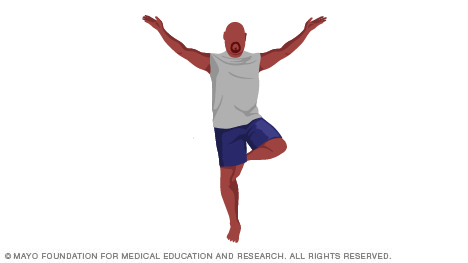
Weight shifts
When you're ready to try balance exercises, start with weight shifts:
- Stand with your feet hip-width apart and your weight equally spread out over both legs (A).
- Shift your weight to your right side, then lift your left foot off the floor (B).
- Hold the position as long as you can keep good form, up to 30 seconds.
- Return to the starting position and repeat on the other side. As your balance improves, increase the number of repetitions.
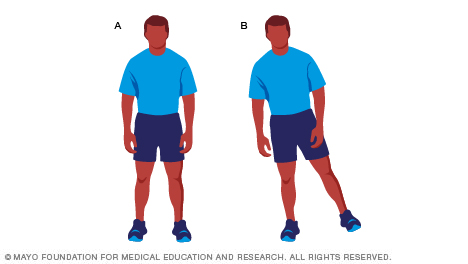
Single-leg balance
Standing on one leg is another common balance exercise:
- Stand with your feet hip-width apart and your weight equally spread out over both legs. Place your hands on your hips. Lift your left leg off the floor and bend it back at the knee (A). If this is too difficult at first, you can stand on one leg while holding onto a stable object, such as a piece of heavy furniture or a table.
- Hold the position as long as you can keep good form, up to 30 seconds.
- Return to the starting position and repeat on the other side. As your balance improves, increase the number of repetitions.
- For variety, reach out with your foot as far as possible without touching the floor (B).
- For added challenge, balance on one leg while standing on a pillow or other unstable surface.
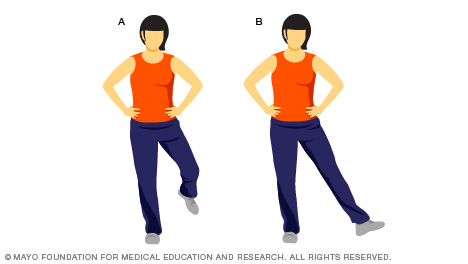
Bicep curls for balance
Weights can make balance exercises more challenging and also activate core muscles. Try biceps curls with a dumbbell:
- Stand with your feet hip-width apart and your weight equally spread over both legs. Hold the dumbbell in your left hand with your palm facing upward (A). Lift your right leg off the floor and bend it back at the knee (B).
- Hold the position as long as you can keep good form, up to 30 seconds.
- Return to the starting position and repeat on the other side. As your balance improves, increase the number of repetitions.
- For added challenge, balance on the leg opposite the weight (C) or while standing on a pillow or other unstable surface (D).
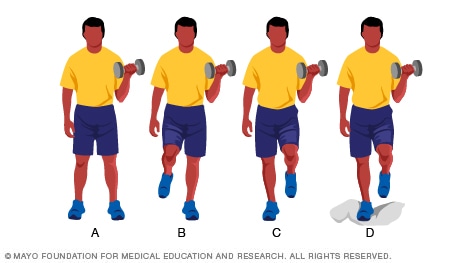
Tai chi for balance
Another exercise that can help improve balance and lower the risk of falls is tai chi — a form of movement training.
Look for group classes offered at local fitness centers or senior centers. Or rent or buy videos or books about tai chi. But keep in mind that it's hard to ensure you're using the right techniques when learning the exercises from a book.
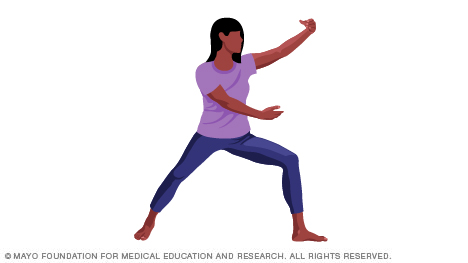
Last Updated Sep 20, 2023
© 2024 Mayo Foundation for Medical Education and Research (MFMER). All rights reserved. Terms of Use